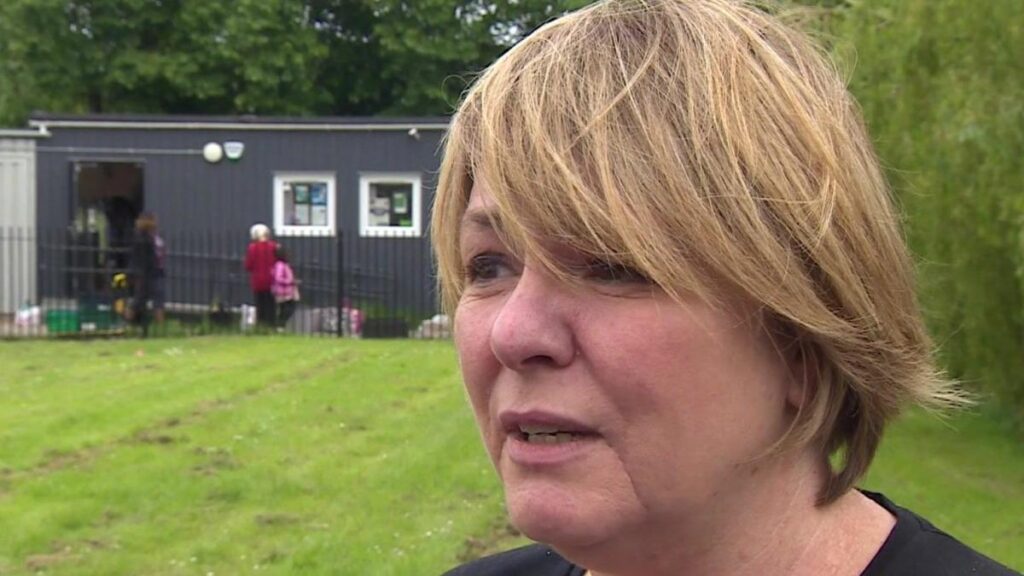Nigerian students hit by financial crisis make up majority of customers at food organization, manager says.
Due to an economic crisis in Nigeria, international students struggled to pay tuition fees. Some from Teesside University were banned from studying and had to return home.
Manager Debbie Fixter said 75% of customers at Thornaby’s Sprouts Community Food Charity (SCFC) were affected students and the situation had reached “maximum capacity”.
The university says it offers support and international applicants must prove they have sufficient financial resources when applying for a visa.
SCFC organizes a range of activities and offers free or low-cost food, as well as clothing and household items.
Over the past few months, the charity said its clientele had noticeably changed, with the majority of visitors being Nigerian masters students from Teesside University.
Nigeria does is currently experiencing the worst economic crisis in a generationwith the value of the naira having fallen by more than 200% against the dollar in the last twelve months.
As a result, students at British universities have seen their savings disappear and budgets suddenly and significantly reduced, leaving them struggling to meet living costs.
Some have subsequently been ordered to leave Britain because they have struggled to pay their tuition fees on time. The BBC reported this this month.
But Teesside University continues to recruit students in Nigeria, according to a spokesperson.
‘Part of our community’
An increasing number of students coming to Britain are turning to charities and community organizations for much-needed help, according to SCFC manager Ms Fixter.
“They are really struggling, they need help and they are part of our community,” she said.
Cllr Boluwatife Elusakin said he has had to “dive deep” to afford the costs of living and studying in Britain.
Nigeria’s economic crisis means he has to spend double what he budgeted.
“Things aren’t the same anymore,” he said.
“I had to cut back because of the currency crash. It affected my savings because I had already budgeted money to come here.
“It makes me sad, but I hope I can last just one year and everything will go well.”
Another student, who did not want to be named, said the university’s change in payment plans – from seven to three installments – had exacerbated the problems.
He said students hoping to find jobs to fill funding gaps were limited by the number of hours they were legally allowed to work.
“When I applied, the exchange rate was about 600 naira per pound, but by the time I arrived it was 1,400,” he added.
“When we filled out the forms, we had proof of nine months’ worth of financing.
“But the money is not enough, you don’t have a job or the means to get one, what little you have is running out and many of us are in trouble.
“If you don’t have money in your pocket, frustration arises and many have mental problems.
“Some wished they had never come.”
‘Maximum capacity’
Ms Fixter said her charity was currently at “maximum capacity” as a result of the situation and called on Teesside University to provide more support.
She said the university had been proactive so far and offered a welcome donation of £500 in Sainsbury’s vouchers after being made aware of the situation, but called it a “drop in the ocean” in terms of what was needed to support the influx of students to the university. charity.
The university said it was working closely with community organizations to direct students back to its own support services and had provided vouchers and contributions to ensure the organizations could provide support to students.
“Teesside University remains a popular destination for students from around the world who choose to study here because of its global reputation for excellence in teaching and research,” a spokesperson added.
“All international applicants must prove they have sufficient funds to cover tuition fees and living expenses as part of the visa application process.”
The university is providing support on a case-by-case basis to those affected by the situation in Nigeria.
Follow BBC Tees on X (formerly Twitter), Facebook And Instagram. Send your story ideas to northeastandcumbria@bbc.co.uk.
More stories from BBC North East and Cumbria
Related Internet Links

